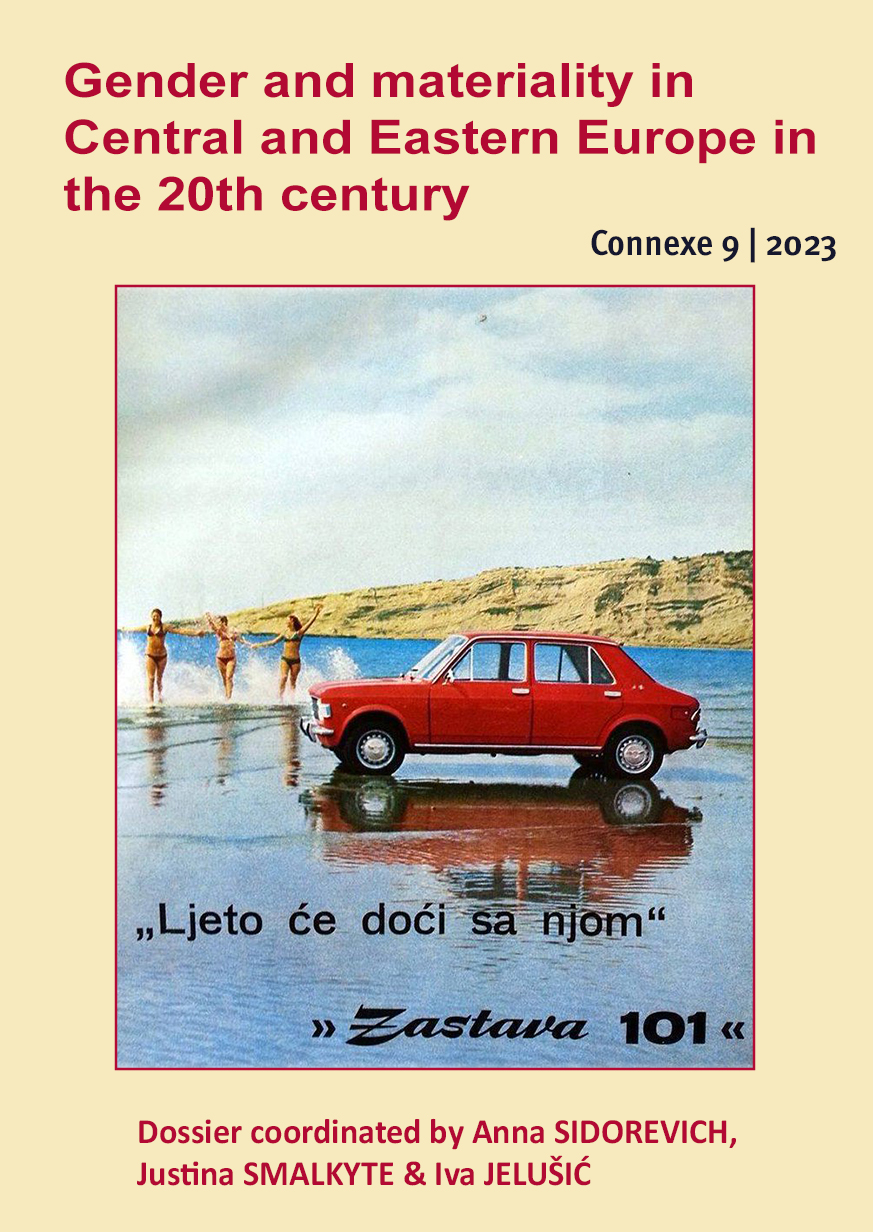“They look better on the breasts”: Advertisement, sexuality, and the bra business in postsocialist Poland
DOI:
https://doi.org/10.5077/journals/connexe.2023.e927Keywords:
Postsocialism, underwear, 1990s, small business, sexualityAbstract
This article examines the 1990s transition from socialism to capitalism in Poland through the lens of the changing market of underwear. Based on oral history interviews, archival research of bra production companies, as well as an analysis of contemporary press reports, I examine how the integration of the Polish economy into the global capitalist system post 1989 influenced its sexual culture. This article shows how the end of the public sector’s monopoly on the production of underwear and the rise of the private sector introduced new form of bras that were codified as sexual by the media and manufacturers themselves. These new types of products mimicked Western European brands, distancing themselves from the socialist era underwear, and incorporated new technology designed to model and discipline female bodies. Through a deep analysis of a 1996 article on the bra business from The Electoral Gazette [Gazeta Wyborcza], the biggest daily newspaper in Poland, I show how the liberal media were ambivalent to such changes and portrayed it as differences between generations of women in the face of calls for stricter censorship from conservative politicians and the Catholic Church.
References
Bartkowski, Jerzy. 2013. “Przedsiębiorcy sektora MŚP i polityka” [SME entrepreneurs and politics]. In Rzemieślnicy i biznesmeni: właściciele małych i średnich przedsięborstw prywatnych [Craftsmen and businessmen: owners of small and medium-sized private enterprises], ed. Gardawski, Juliusz, 348-398. Warszawa: Scholar.
Boćkowska, Aleksandra. 2017. Księżyc z Peweksu. O luksusie w PRL [The moon from the Pewex. About luxury in the People’s Republic of Poland]. Wołowiec: Wydawnictwo Czarne.
Borys, Monika. 2019. Polski bajer. Disco polo i lata 90 [Disco Polo and the 90s]. Warszawa: Wydawnictwo W.A.B.
Corado, Cristina, Benacek, Vladimir, Caban, Wiesław. 1995. “Adjustment and performance of the textile and clothing industry in the Czech Republic, Poland and Portugal”. London: Centre for Economic Policy Research.
Dobrowolska, Anna. 2022. “Sex, communism, and videotapes: Polish Sexual (r)evolutions, 1956-1989”. Oxford: University of Oxford. https://ora.ox.ac.uk/objects/uuid:b3d0d044-fd4b-4e06-9f7a-b60a3a265d7f.
Dunn, Elizabeth C. 2004. Privatizing Poland: Baby food, big business, and the remaking of labor. Ithaca, NY: Cornell University Press. https://www.jstor.org/stable/10.7591/j.ctvrf8ck6.
Fehérváry, Krisztina. 2009. “Goods and States: The political logic of state-socialist material culture”. Comparative Studies in Society and History 51 (2): 426-59. https://doi.org/10.1017/S0010417509000188.
Gardawski, Juliusz. 2001. Powracająca klasa: sektor prywatny w III Rzeczypospolitej [The returning class: the private sector in the Third Republic]. Wydawn. Instytutu Filozofii i Socjologii PAN.
Gardawski, Juliusz, ed. 2013. Rzemieślnicy i biznesmeni: właściciele małych i średnich przedsięborstw prywatnych [Craftsmen and businessmen: owners of small and medium-sized private enterprises]. Warszawa: Scholar.
Ghodsee, Kristen. 2018. Why women have better sex under socialism: And other arguments for economic independence. New-York, NY: Random House.
Grabowska, Magdalena. 2018. Zerwana genealogia: Działalność społeczna i polityczna kobiet po 1945 roku a współczesny Polski ruch kobiecy [A broken genealogy: Women’s social and political activity after 1945 and the contemporary Polish women’s movement]. Wydanie pierwsze. Warszawa: Wydawnictwo Naukowe Scholar.
Gurova, Ol’ga. 2009. “The art of dressing. Body, gender and discourse on fashion in soviet Russia in the 1950s and 1960s”. In The fabric of cultures: Fashion, identity, globalization. Paulicelli, E., Clark, H., eds. London, New York: Routledge.
Heineman, Elizabeth. 2011. Before porn was legal: The erotica empire of Beate Uhse. Chicago: University of Chicago Press.
Ibroscheva, Elza. 2013. Advertising, sex, and post-socialism: Women, media, and femininity in the Balkans. Lanham, MD: Lexington Books.
Ibroscheva, Elza. 2020. “From socialist amazons to bodies on full display: Gender stereotypes in Bulgarian advertising during socialism and the post-socialist transition”. Contemporary Southeastern Europe 7 (2): 45-61.
Jackson, John, Klich, Jacek, Poznanska, Krystyna. 2005. The political economy of Poland’s transition: New firms and reform governments. Cambridge: Cambridge University Press. https://doi.org/10.1017/CBO9780511510182.
Karamihova, Margarita. 2020. “Some gender aspects of socialism”. EthnoAnthropoZoom 20: 165-195.
Keinz, Anika. 2011. “European desires and national bedrooms? Negotiating ‘normalcy’ in postsocialist Poland”. Central European History 44 (1): 92-117.
Kościańska, Agnieszka. 2021. To see a moose: The history of Polish sex education. New York, N.Y: Berghahn Books.
Kurz, Iwona. 2017. “Goła Baba” [Naked Baba]. In Kultura wizualna w Polsce. Spojrzenia [Visual Culture in Poland. Views], eds. Kwiatkowska, Paulina, Szczesniak, Magda, Zaremba, Lukasz, 47-55 Warszawa: Fundacja Bęc Zmiana, Uniwersytet Warszawski.
Lipiński, Piotr, Matys, Michał. 2018. Niepowtarzalny urok likwidacji: reportaże z Polski lat 90 [The unique charm of liquidation: reports from Poland in the 1990s]. Wydanie I. Reportaż. Wołowiec: Wydawnictwo Czarne.
Lišková, Kateřina. 2018. Sexual Liberation, Socialist Style: Communist Czechoslovakia and the Science of Desire, 1945-1989. Cambridge: Cambridge University Press (doi) : https://doi.org/10.1017/9781108341332.
McLellan, Josie. 2011. Love in the time of communism: Intimacy and sexuality in the GDR. Cambridge, New York: Cambridge University Press.
Skąpska, Grażyna. 2002. Buddenbrookowie czy piraci: Polscy przedsiębiorcy okresu głębokich przemian [Buddenbrooks or pirates: Polish entrepreneurs in a time of profound change]. Kraków: Universitas.
Stusińska, Ewa. 2021. Miła Robótka: Polskie Świerszczyki, Harlekiny i Porno z Satelity [Nice work: polish crickets, harlequins and satellite porn]. Wołowiec: Wydawnictwo Czarne.
Szcześniak, Magda. 2016. Normy widzialności: tożsamość w czasach transformacji [Norms of visibility: identity in times of transition]. Warszawa: Fundacja Nowej Kultury Bęc Zmiana, Uniwersytet Warszawski.
Wallace, Claire, Sik, Endre. 1999. “The Development of open-air markets in East-Central Europe”. International Journal of Urban and Regional Research 23(4): 697-714.
Zaremba, Lukasz. 2018. Obrazy wychodza na ulice: Spory w polskiej kulturze wizualnej [Images take on the streets: Disputes in Polish visual culture]. Warszawa: Fundacja Bec Zmiana.
Гурова, Ольга, 2008. Советское нижнее белье: Между идеологией и повсед- невностью [Soviet underwear: Between ideology and neutrality]. Москва: Новое литературное обозрение.
Downloads
Published
How to Cite
Issue
Section
License
Some rights reserved 2023 Marta Chmielewska

This work is licensed under a Creative Commons Attribution 4.0 International License.




